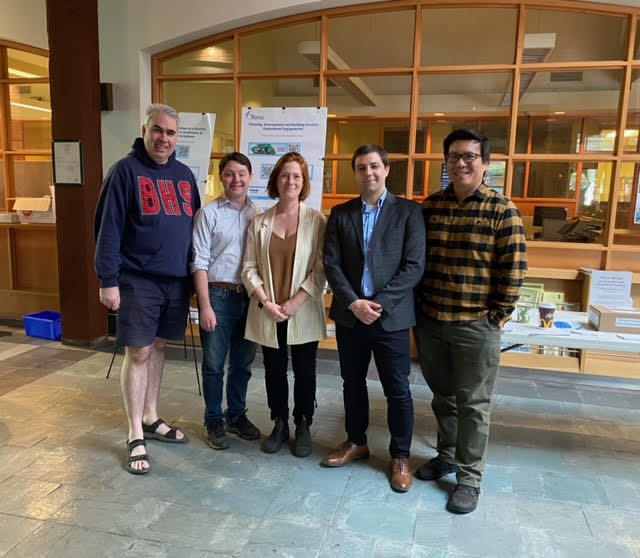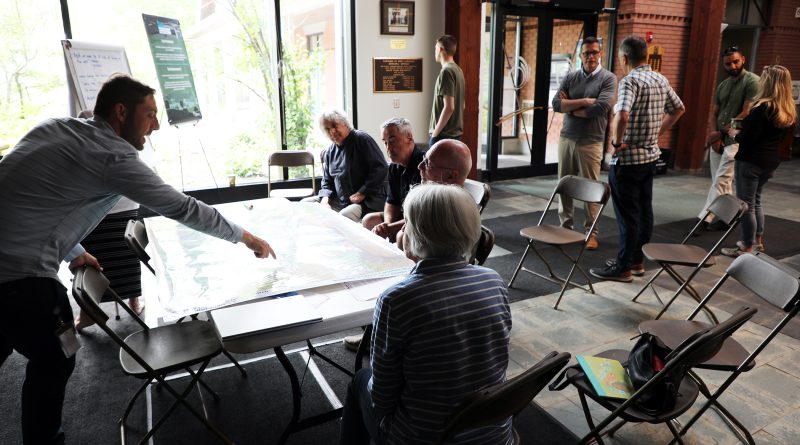Ward 5 Rural Summit workshop engaging
By Nonie Smart - West Carleton Online
KINBURN – Last Saturday (June 1) morning Coun. Clarke Kelly welcomed a full house to the West Carleton Community Complex Roly Armitage Hall for the first ever Ward 5 Rural Summit workshop.
It has been a long time coming since the last summit was held 15 years ago.
“Rural Summits were an innovation that came out of amalgamation of the City of Ottawa that was supposed to happen every term of council,” he said. “Why did they stop? I don’t know. But what I can tell you the very first action I made as your councillor was moving a motion to bring them back. That is something I am proud of.”
It was several longtime constituents of West Carleton March that planted the seed according to Kelly. However, he told the roughly 100 attendees including West Carleton Online, many have supported this initiative since then; it has not been something he could do alone.
“This wasn’t a huge topic during the campaign,” he said. “Maybe four or five people raised the summit with me; two of them are here today, Ken Holmes and Shirley Dolan (Rural Summit Resident Working Group representatives). These two have been working extremely hard for months. They have been organizing this, consulting with residents, businesses, organizations, stakeholders. Their efforts have been amazing and I thank them very much.”

He also acknowledged the city’s support for the summit.
“I can tell you we have a mayor that has been dedicated to making sure this Rural Summit will be a success since the day I moved that motion,” Kelly said. “He will be coming this afternoon but he does have eyes and ears here this morning. I also recognize my Agriculture and Rural Affairs committee (ARAc) colleagues for their dedication to making noticeable and meaningful differences for the people of rural Ottawa.”
Kelly said the first person to mention the summit was unable to attend today but is very much on his mind.
“There is another person I would like to acknowledge who is absent today,” Kelly said. “I believe she was the very first people who talked to me about bringing back the Rural Summit. And that is Adele Muldoon. For those of you who have not heard the very sad news Leo Muldoon passed away on Thursday (May 30). I would like to recognize that Leo was an amazing man in his community, an amazing farmer, father, husband and just an awesome guy.”
He recalled dropping by the Muldoon farm in the early days of the last election.
“One of the first doors I knocked on as a councillor was the Muldoons,” Kelly said. “If you want to have any chance of winning an election here you go and see Adele and Leo. So, I drove down the driveway and knocked on the door about a month after I put my name on the ballot. I didn’t know Leo all that well but it’s safe to say he was man of few words. He came to the door, and I said, ‘do you know who I am and why I am here?’ He didn’t say anything. He just opened the door and walked into his house. So, I took a step in and looked at him. Again without saying anything he just pointed at the couch. And so to this day I still don’t know if he knew who I was and why I was there. But he did just seem to know that there was someone at this door that wanted to talk and that seemed to be enough for him.”
There were also others in attendance Kelly wished to recognize.
“I’d like to acknowledge the presence of councilors David Brown, Wilson Lo, Laine Johnson, and Riley Brockington which I think is fantastic to have some urban and suburban councilors in attendance,” Kelly said. “Also Kanata-Carleton MPP Karen McCrimmon is here now. I’m also proud that there will be three generations of my family here today. My dad is at the back and my 21 month old daughter will be here this afternoon. She wasn’t interested in coming until the mayor was going to be here.”
Kelly said Saturday’s exercise is all about focusing on the positive and respecting other people’s viewpoints.
“So I understand there are frustrations and that is one of the reasons we are here,” Kelly said. “We know rural residents are consistently less satisfied with the services of the city than the urban and suburban residents of the city. So I’m hoping we channel that today in a positive way. Let’s talk about what we are facing and the potential solutions; your ideas to get around those problems. There will be varying opinions at the table. I want every single person here to feel respected. To feel like they have the ability to raise what they want, in the way they want to do it.”
In closing Kelly thanked participants for showing up and city staff for facilitating the discussion groups. He then turned the floor over to Stephane Galipeau, Stakeholder Engagement coordinator for the city who is responsible for engagement on the Rural Summit.
“We launched a survey March 21 to help identify themes that were important to people,” Galipeau said. “We have had more than 1,000 survey responses and the survey is still open. We also need to do this in person so that is why we are here today for the one-on-one conversation with you. We are also doing community outreach such as the tent we set up at a recent fair in Osgoode. If you would like to invite us to an event you are having in your community let us know at ruralsummit@ottawa.ca.”
Approximately two hours of the workshop was allotted to discussion groups on seven themes including; transportation, agriculture, development and zoning, consultation and communication, community services, health and safety, and environment. For those who did not see their theme represented there was an eighth group for any other topics. Participants were asked to change groups every 20 minutes so they would contribute to four discussions in total.
“It’s an open discussion,” he said. “City staff are here to listen and answer questions.”
Discussion groups numbered roughly six to 12 participants and were scattered throughout the complex with one group meeting outside. In the final half hour of the workshop each facilitator reported to the reconvened participants on the most common issues discussed in their group.
The number and diversity of issues raised over the three-and-a-half hour workshop are too numerous to report in full, however, some common themes included; preservation of agriculture and rural lifestyle, community policing and infrastructure maintenance.
Many residents voiced concern their rural lifestyle could be under threat by development especially in the villages. Some felt the city is not listening to residents but only paying lip service to the issue. It’s not that they were not against development, said some, but they would like to see restrictions on dense housing in villages and initiatives in place to keep farmland as farmland.
Emergency response and level of community policing was addressed by superintendent Ken Bryden, and staff Sgt. Andrew Pipcock of the Ottawa Police Service (OPS) who started the conversation by acknowledging some differences between urban versus rural policing.
“West Carleton being a huge geographical area makes it challenging for patrolling with current staffing levels,” Bryden said at the health and safety discussion. “However, Chief Stubbs has a four year staffing regeneration program so I feel it is improving.”
Residents also expressed substantial concern about the speeding they encounter on West Carleton roads. Bryden said he was not surprised to hear this and suggested the best way for the OPS to know where the problems are is for residents to report incidents.
“It’s extremely important to call and report,” he said. “It really is. Particularly in today’s policing environment in terms of us needing to be in the right place at the right time because data and stats tell us. So please keep reporting.”
The maintenance of roads and ditches was also on people’s minds as some questioned whether the city was appropriately funding these needs.
Some suggested poorly maintained roads with uneven pavement, crumbling gravel shoulders and broken asphalt edges are hazardous for all road users including pedestrians and cyclists. In addition, poorly controlled vegetation as noticed along Ward 5 roadways may restrict the ability of agricultural equipment to yield right, hide signs and obscure sight lines.
With a proposed “ditch tax” in the works there were many who asked about ditch maintenance or lack thereof. As compared to urban areas where every pipe and sewer is identified and maintained on a regular basis the maintenance of rural ditches is most often seen as complaints driven.
The Rural Summit is scheduled for November 2024 but the date has not yet been confirmed. For further information on the summit see https://engage.ottawa.ca/rural-summit-2024.
West Carleton Online publisher Jake Davies attended the afternoon session which also featured Mayor Mark Sutcliffe and that story will be shared Tuesday, June 4.











